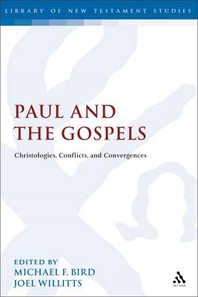
In a recent JSPL article[1] William O. Walker states his case for understanding Romans 8:29–30 as being an interpolation.[2] Having recently finished a six month research project, in which I tried to explain how this passage fit into the flow of Romans, one could understand why I was saddened that I stumbled upon it almost immediately after I turned in the finished version of my work. Honestly, I hadn’t considered or even read anyone who had considered the passages authenticity.
In what follows I will critique what i believe are fatal weaknesses in his proposal, but before I do, I would like to state a few things that I appreciated about his work. First, I believe he is completely right to point out that this passage, especially vv. 29, 30, are strange in comparison to the surrounding material. Second, this article helped me think through much more carefully my methodology for determining if a passage is authentic or not. Now, on to the article. [3]
Following an earlier criticism by J. C. O’Neill, Walker believes that the passage (vv. 29, 30) creates a “logical contradiction” with what Paul has said earlier in the text. The tension is caused by the juxtaposition of two concepts: 1) it is emphasized that the believer must receive the Spirit by faith and, 2) Christians are predestined from the beginning. In other words, free will and divine sovereignty cannot be held together by a logical person.
O’Neil, though, doesn’t seem to be as convinced or clear minded about this “logical contradiction” as one would hope because he then questions the merits for the supposed contradiction that is being used for “evidence.” After he agrees with O’Neil that there is a contradiction he goes on to say, “It would be difficult to argue, however, that Paul does not elsewhere espouse some form of a doctrine of election or that he does not elsewhere alternate between divine and human agency.” It seems very difficult to ascertain the exact reason that Mr. Walker believes this “evidence” should be allowed into an argument that seeks to prove an interpolation since we know that this “contradiction” is present in undisputed portions of Paul’s writings and, ostensibly, in those texts it is not evidence of an interpolation.
Next, he says, “In the second place, the ‘person’ and ‘number’ indicated in the verbs and pronouns of w. 29–30 are different from those in the surrounding material.” He then points out that, “most of the language in w. 1–27 and much of that in vv. 31–39 is in the first-person plural— ‘we’ and ‘us,’” Strangely he only footnotes (n20) that verses 9–11 are in the second person plural. Not only that, but then he admits, “Indeed, the fact that v. 28ab (presumably Pauline in origin) shifts from the first-person plural to the third-person singular would appear to argue against such a shift as evidence for interpolation.” In spite of all the qualifying he makes he still feels that the evidence, “at least suggests that these verses may be an insertion into the text of Paul’s Roman letter.” Again, just like the first piece of evidence, I am not sure how this can be considered evidence for anything, much less his argument for interpolation.
The third piece of evidence forwarded for the case of interpolation is that this section is, “systematic, linear, repetitive, formalized, and one might almost say ‘scholastic.’” The reason for this being evidence of interpolation is that the surrounding material is, “much less formal and repetitive and much more free-flowing.”
In response, a couple of obvious points should be brought out. First, why if we are seeking to establish an interpolation should we only consider the surrounding material? Mustn’t we ask if there are other places in the “undisputed” letters where Paul does this sort of thing? Second, even if for the sake of the argument we assume this criticism is valid, then wouldn’t we first be led to the possibility that Paul is using tradition? Wouldn’t a creed, confession, or liturgy of some sort naturally lend itself to have all of these characteristics? I can’t help but think of the Christ Hymn in Philippians 2 and this passage as being taylor fitted for this sort of claim.[4] While I will have to postpone my thoughts on the form and function of this passage to a later post, I do think Walker is right to point out the characteristics of the passages form as being a reason to reconsider its function; this is the way communication works in general.
The fourth piece of evidence that Walker sees is, “there appears to be something of a disjunction between w. 29–30 and their context in terms of subject matter.” By continuing to point out Walker’s own hesitancy to clearly label his own evidence as clear or indisputable I run the risk of appearing to beat a dead horse, yet when one builds a circumstantial case for something their own uncertainty of their own evidence must actually become key evidence itself. In regards to the subject matter of chapter 8 he says, “It is difficult to assemble the somewhat disparate parts of Romans 8 under a single topic.” I have much more to say about this (rightly) so-called subject change, but, for now, I will simply point out that while I will concede with Walker that the general topic of the chapter is, “life in the Spirit,” suffering and its ability to rob the community of its Spirit-life through unbelief plays the antagonist in the story of the Church and this section can easily be seen as building hope for people who need to endure suffering.
The fifth thing that is used as evidence for the case of interpolation is, “the removal of w . 29–30 would leave a smooth transition from v. 28… either with or without the last five words—to v. 31.” I do not disagree with this conclusion. In my thesis, which was finished before I read this article, I brought up what is almost the same thing,
“Interestingly, if one would remove vv. 28–37 the section would still make complete sense. Paul would have moved from the presence of suffering, to its temporality, to its effect (produce endurance and hope), to the believers defense against it (the Spirit) to suffering’s inability separate the Christian from God’s love. The section following vv.28–37 would still function nicely as an inclusio since it incorporates all of the themes found in the the pericope that opens the section.”
My only reason for discussing this aspect of his case’s evidence is that what we disagree with here is the most likely application of this evidence. I do not think that the evidence leads one to conclude that this section could be an interpolation, but the most likely conclusion is to understand that Paul is doing something much more subtle here with this section. This subtlety should leads us to reflect on the text as a whole and what we believe we can surmise about its provenance and audience.
The last thing discussed about this section is that it, “can stand alone as a complete, self-contained, and meaningful theological statement that sets forth, in systematic fashion, a logical progression from foreknowledge to predestination to calling to justification to glorification.” I don’t really know how to respond to this charge since I am not really sure how the logic works. If the logic of this charge is: the surrounding section is not this way (complete, self-contained etc.), so this section could be viewed as an interpolation, then, I must disagree with the logic. Also, I would wonder how I should understand Rom. 1:2–4 which itself is very similar in that it doesn’t really ‘fit’ the way the rest of the passage is constructed (using the previous logic).[5]
Finally, I would like to comment on the legitimacy of an argument for interpolation by the accumulation of circumstantial evidence. From what I understand about jurisprudence, certain crimes tend to require certain types of evidence in order to secure a verdict e.g., a body in a murder case. The same expectation is usually (except among the mythicists) required in the case of interpolation. If there is no textual witness to interpolation, then the case for interpolation is typically viewed as suspicion and not as an argument of facts and logic.[6] I do not have a problem with an interpolation having made it through the early years if the cannon’s formation undetected; undoubtedly that sort of thing happened and scholars should endeavor to find interpolations. My main problem is that there is nothing in the case that cannot just as easily be argued in the opposite direction. When this is the case, the evidence is not really evidence it is opinion.[7]
-
Walker, William O. “Romans 8:29–30 as a Non-Pauline Interpolation” JSPL vol. 2, no. 1 (2012): 28. ↩
-
Actually he includes v. 28c and v.33 in his article, but for my purpose I will only discuss the material relevant to vv. 29–30 ↩
-
In this review I will only discuss what the author calls “contextual” evidence for his argument. Maybe, at a later date, I can engage with his linguistic evidence for interpolation. ↩
-
Of course, it is equally likely that Paul used some of his more memorable creations in suitable places within his written compositions. ↩
-
From the commentators that I checked, this section is usually viewed as at least having its genesis in an earlier creed. (see Jewett, Robert and Roy David Kotansky. Romans: A Commentary. Edited by Epp, Eldon Jay. Hermeneia—a Critical and Historical Commentary on the Bible. Minneapolis, MN: Fortress Press, 2006, 103 – 104. ↩
-
of course, there are extreme circumstances when the need for this type of evidence can be excused but there would need to be extreme mitigating circumstances e.g., eyewitness testimony of the crime. The same could go for interpolation; if there was an ancient testimony of a text being an interpolation or one of the earliest witnesses quotes the passage and leaves the section out (or, visa versa), then maybe we could proceed. ↩
-
I am doing my best to channel my inner “grand inquisitor” here. ↩





 His argument rests on two major observations: 1) Scholars have not often distinguished between the forbidden and allowed paradigm and the clean and unclean paradigm. 2) Christianity is not, as has traditionally been thought, an anti-Jewish movement. It is a movement from within Judaism and is in opposition to a current view within their religion (that of the Pharisee’s).
His argument rests on two major observations: 1) Scholars have not often distinguished between the forbidden and allowed paradigm and the clean and unclean paradigm. 2) Christianity is not, as has traditionally been thought, an anti-Jewish movement. It is a movement from within Judaism and is in opposition to a current view within their religion (that of the Pharisee’s). Apparently, God’s love is so important that to talk of Jesus’ father blinding people so that they won’t see bordered on heresy. It is like everyone gladly acknowledges, in theory, God’s hatred of things (or people) yet we must never speak of it; It’s there but never comes into play — like the dark side of the moon. This hermeneutical insistence among Christians (that I know either personally or through forms of media) has always puzzled me.(I can’t think of a way that deliverance can be accomplished apart form judgment.) But, since I do not share the need to expunge hatred from God I will present the case for YHWH (or Jesus’ Father) as being the referent for this phrase. (Please note: I am not saying YHWH has to be the referent but, he could be the referent.)
Apparently, God’s love is so important that to talk of Jesus’ father blinding people so that they won’t see bordered on heresy. It is like everyone gladly acknowledges, in theory, God’s hatred of things (or people) yet we must never speak of it; It’s there but never comes into play — like the dark side of the moon. This hermeneutical insistence among Christians (that I know either personally or through forms of media) has always puzzled me.(I can’t think of a way that deliverance can be accomplished apart form judgment.) But, since I do not share the need to expunge hatred from God I will present the case for YHWH (or Jesus’ Father) as being the referent for this phrase. (Please note: I am not saying YHWH has to be the referent but, he could be the referent.)

